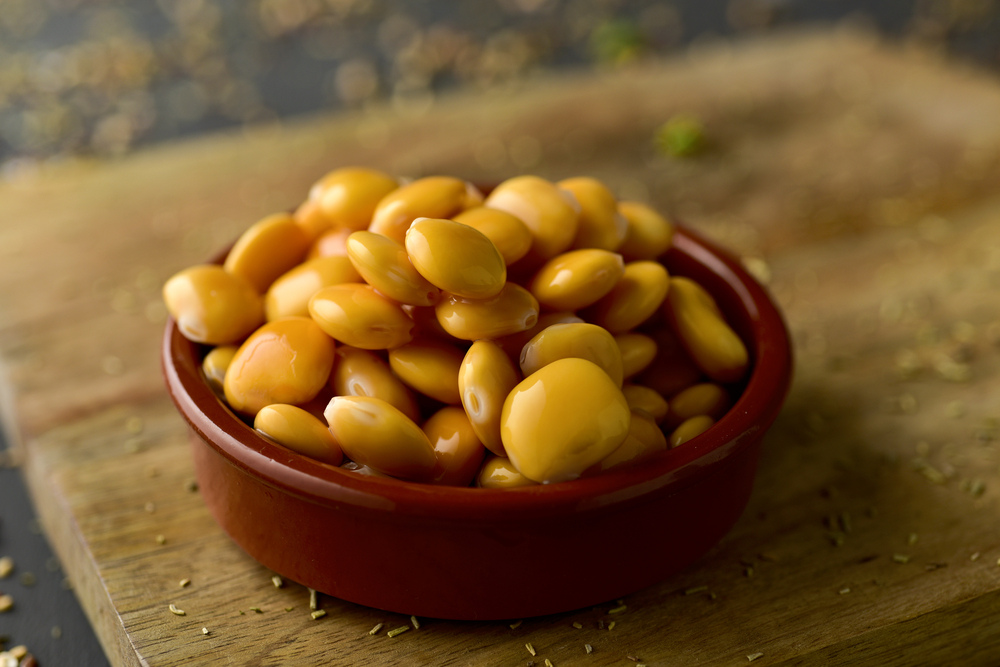Top 8 Surprising Health Benefits of Lupini Beans
Fulfilling your protein requirement is easier with Lupin beans. Know all about the benefits of Lupini Beans and amazing recipes here.

Beans are super-rich in nutrients our bodies require to carry out several metabolic processes. Therefore, you must know the best health benefits of lupini beans if you want to incorporate more beans and protein-packed foods into your daily diet. While lentils and legumes have carved a niche for themselves on the shelves of most grocery stores and supermarkets, lupini beans are less available. However, their rich nutritional profile makes them a great pick for all those people wanting to consume less meat. These humble beans are highly alkaline and may taste bitter when not cooked properly; thus, knowing the preparation and right cooking technique is crucial to get the most out of them. Know the preparation and a few key reasons why you should start including this healthful food in your diet regularly.
What Is Lupin Bean?

Lupini beans are golden-yellow colored beans derived from the fruits of the Lupini plant, which belongs to the family of peas, chickpeas, and fava beans. Lupinus albus beans are widely cultivated in Latin America, Greece, Italy, Cyprus, and Palestine. These leguminous seeds have a high protein content and are commonly consumed as a snack by people in Latin America and the Mediterranean regions. Apart from diversifying the grocery stock in your kitchen, these nutritious beans can benefit your overall health. Before we look into the best health benefits of eating these crunchy yet humble beans, take a sneak peek at their nutritional profile.
Lupin Beans Nutrition Facts
As per the U.S Department of Agriculture, 100 grams of cooked and salted Lupin beans provide you with the following nutrients (1):
- Calories - 106
- Protein - 15.6 grams
- Fat - 2.92 grams
- Fiber - 2.8 grams
- Calcium - 51 milligrams
- Iron - 1.2 milligrams
- Magnesium - 54 milligrams
- Phosphorus - 128 milligrams
- Potassium - 245 milligrams
- Leucine - 1.8 grams
Top 8 Health Benefits of Lupini Beans
1. May Boost Digestion
Lupin beans are rich in dietary fibers which help boost digestive health. The dietary fibers and active compounds in these legumes aid regular bowel movements and lower your risk of suffering constipation and IBS (2). As per our contributor Trish Gomez, a RDN and certified trainer, IBS can cause episodes of constipation, diarrhea, or alternating periods of each. “Dietary fiber, in combination with adequate fluid intake, improves both diarrhea and constipation in a number of ways," she adds. Besides, the fiber content found in sweet lupin beans may help lower your chances of serious digestive disorders such as colon cancer (3).
2. May Boost Cardiac Health

Hypertension (high blood pressure) affects a large number of the population across the globe. High-sodium diet, kidney malfunction, and stress are a few common causes of hypertension and other cardiac ailments. Lupin beans are one of the best sources of protein and the protein found in lupin beans is said to reduce your chances of suffering from hypertension and may improve vascular endothelium functions. Besides, active compounds in lupin beans may help relax blood vessels for improved flow of blood in the heart and help manage cholesterol levels, thus reducing the risk of hypertension, stroke, and cardiovascular disease (4).
3. May Help Boost Gut Health
Having a good digestive system is the key to maintaining overall health. Your intestines play a great role in absorbing the nutrients from the food you eat to nourish the body with essential nutrients. Poor gut health can lead to several health issues. Lupini beans come packed with dietary fibers that help improve gut microbiota and intestinal health (5). Also, the healthful compounds in lupini beans reduce the growth of harmful intestinal bacterium, thus lowering your risk of experiencing intestinal disorders.
4. May Help Manage Anemia
Lupini beans contain rich amounts of vitamin C which help in iron absorption in the body and support the production of hemoglobin, thus reducing your chance of getting anemia. Shedding light on this topic, our contributor Trish Gomez says, “Vitamin c helps improve our body’s absorption of iron, especially non-heme iron (iron that is found in plant foods, and is not absorbed as well). This is especially important for people who abstain from, or eat very little chicken, beef, or seafood (which contain the most absorbable forms of iron, heme iron). Adding vitamin c rich foods like lupini beans, peppers, tomatoes, potatoes, citrus, and strawberries to every meal can help improve iron absorption, and reduce the risk of developing anemia.”
Some common symptoms of anemia include shortness of breath, dizziness, and fatigue. Including cooked lupini beans in your diet regularly may help reduce your risk of suffering blood disorders like anemia and relieve their symptoms (6).
5. May Improve Skin Health

Lupini beans brim with healthful antioxidants that are known to fight free radicals and oxidative stress in the body, thus slowing down the pace of aging and improving skin health. Free radicals are the free atoms that are known to cause cellular damage in the body and cause premature aging and illnesses.
According to Shweta Shah, Founder Of EatFit247, “Oxidative stress occurs when an imbalance between free radicals and antioxidants damages cells, including those in the skin. This process harms the skin by breaking down collagen, causing premature aging, fine lines, and wrinkles. It can also lead to inflammation and disrupt the skin's barrier function, causing dryness, redness, and sensitivity. To counteract this, I, as a holistic nutritionist, suggest a diet rich in antioxidants like vitamins C and E, along with a skincare routine to combat oxidative stress and maintain youthful, healthy skin.”
The antioxidants in lupini beans help prevent the formation of dark spots, wrinkles, and sagging skin. Also, the skin protective properties of antioxidants also lower your chances of suffering serious skin conditions such as skin cancer (7). Besides, vitamins, minerals, and essential amino acids in these golden-yellow kernels deeply nourish the skin cells and may help you achieve smooth, young, and healthy skin.
6. May Help Boost Immunity
If you are keeping in good health today, thank your immune system. Your body’s natural defense mechanism protects you against a variety of allergies, infections, and diseases. Lupini beans are enriched with an array of immune-boosting vitamins such as vitamins C, A, B, and magnesium which may strengthen your immunity and safeguard you against a variety of health problems (8).
7. May Help Lower Blood Sugar Levels

Just like cardiovascular health risks, diabetes is another common health problem that affects millions of persons worldwide. Eating foods that are high in dietary fiber and with low -glycemic index may help in blood glucose regulation. Conglutin compound in lupin seed helps reduce the levels of blood glucose in people with hyperglycemia, which makes it a natural antidiabetic remedy. Including lupin beans in your diet may help manage blood glucose levels and lower your chances of suffering type 2 diabetes (9).
8. May Improve Bone Health
With growing age, your bones and muscles get worn out and become weak. In such cases, eating foods rich in calcium, magnesium, and proteins may help improve bone and muscle health. Lupini beans make a rich source of calcium, minerals, proteins, and other healthful nutrients. Eating a diet rich in calcium helps improve the mineral density of the bones and strengthens them, which reduces your risk of suffering fractures and other bone problems (10). Besides, the healthy proteins in lupini beans may improve the health and strength of skeletal muscles in the body, which not only improves muscle and joint mobility but also improve your quality of life as well (11).
How to Consume Lupini Beans?

Now that we know the nutritional profile and the best health benefits associated with lupini beans, knowing the right ways to consume these tender beans is equally important.
Just like the versatile health benefits they provide, lupin beans can be consumed in a variety of ways. These tender beans can be eaten as a snack alone, as a part of the main course dishes, or even after the meal as most people living in Italy do.
Most people across the globe prefer consuming delectable recipes made with lupini beans. Learn to make some delicious recipes using lupin beans that can satiate your taste buds alongside deeply nourishing the body.
1. Pear Spice Cookies
The crunchy cookies make tempting snacks that are filling and highly nutritious. You can prepare pear spice cookies at home by following these simple steps.
To make pear spice cookies, you will need:
- 1-19 oz - lupini beans
- 1 cup of maple syrup
- ½ cup of cashew butter
- 5 pears - peeled and sliced
- 2 cups of oat flour
- ½ tbsp of cinnamon powder
- ½ tsp of nutmeg powder
- ½ tsp of dried ginger powder
- ½ tsp of vanilla extract
Steps
Step 1- Take lupin beans and put them in a strainer. Rinse well with tap water to remove the debris and toxins from the beans.
Step 2- Transfer the ingredient into a high-power blender and blend the beans to form a smooth paste.
Step 3- Now, put the remaining spices and ingredients into the mixture and whisk well.
Step 4- Put cookie sheets in a tray and pour cookie batter onto the parchment sheet using a big spoon or ladle.
Step 5- Bake the cookies at 350 degrees for 20-25 minutes or until the upper layer of the cookies becomes golden brown.
Step 6- Take them out of the oven and allow them to cool. Store in an airtight container.
2. Marinated Tremocos
To make Marinated Tremocos, you will need:
- 1 cup of dry lupini beans, rinsed
- 1 liter of water
- 2 cloves of garlic ( peeled and slivered)
- 1 tablespoon of olive oil
- ½ teaspoon of black pepper powder
- White pepper (optional).
- Fresh chopped parsley for garnishing
- 4 tablespoons (1/4 cup) of regular salt
Steps
Marinated Tremocos is a lupin bean recipe for people with great patience as it requires a long time to prepare the dish. Despite the long processing time, the cuisine is rewarding both for your taste buds as well as for your health. Here are the steps you can follow to prepare a flavorful lupini beans recipe.
Soaking the Beans
Step 1- Take a deep bowl and soak the lupin beans for 24 hours. Make sure the beans are immersed in the water and add more water if required.
Step 2- After 24 hours, boil the beans slightly and allow them to cool down. Remove the water using a strainer and rinse the beans with tap water. Strain the water and rest the beans to dry.
Step 3- Now take a bowl and fill it with cold water. Put all the lupin beans in the bowl, completely immersing the beans in the water. Now, put the bowl in the refrigerator.
Step 4- For the next 14 days, change the water in the bowl with fresh cold water and again keep it in the refrigerator.
Step 5- On the 15th day, add 4 tablespoons of salt and slivered garlic into the bowl containing lupin beans immersed in cold water. Let the beans soak again overnight.
On the 15th day
Once the lupin beans are ready to eat, you can take out the desired amount of the beans in a bowl and toss them with olive oil and other spices.
You can sprinkle the spices of your choice and pepper if you want your dish to be spicy.
Precautions And Warnings
Lupin beans may cause toxicity if not prepared and washed thoroughly before consumption. Here are a few tips that can help you lower your risk of experiencing ill effects.
1. If you are using canned lupini beans, ensure to rinse them well under flowing water to remove impurities, toxins, and bitterness in the seeds.
2. When using dry beans, pre-soak to restore the tenderness of the beans. However, the soaking time differs according to the dish you wish to prepare using these beans. While for some recipes you may need to soak the beans for two weeks; for others, they may be soaked for 7 to 10 days.
3. The best way to prepare the beans for consumption is to soak these beans in cold water for 15 days. Shweta Shah says, “Soaking lupini beans before consumption is crucial for optimizing their nutritional value and digestibility. Lupini beans contain anti-nutrients like phytates and enzyme inhibitors, which can hinder nutrient absorption and cause digestive discomfort. Soaking helps break down these compounds, making the beans easier to digest and improving nutrient absorption. Also, soaking reduces cooking time and softens the beans texture. This process also activates enzymes that aid in nutrient release and can enhance the bioavailability of essential minerals.”
4. Crushed seeds are more likely to get infected by fungus and may cause health problems upon consumption.
5. Consuming lupin beans in excess may cause poisoning. High amounts of alkaloids in the beans may show poisoning symptoms such as increased heart rate, blurred vision, salivary suppression, and many others (12).
Conclusion
Lupin beans are highly nutritious and share a versatile culinary use. Though the benefits of lupini beans are many, you must ensure to prepare the beans well by soaking them in cold water for a couple of days to lower the risk of toxicity. Once the alkaline compounds are washed off by soaking the beans thoroughly, there is no reason to be worried and you can make them a part of your diet for the best health benefits. The active compounds in the lupin beans are known to improve heart health, gut health, immune & skin health, and many others. If you are looking for natural sources of high proteins, include lupini beans in your diet and get ready to experience some of the best health benefits.
Contributor: Trish Gomez, Registered and Licensed Dietitian and Certified Personal Trainer





 JOIN OUR WHATSAPP CHANNEL
JOIN OUR WHATSAPP CHANNEL























































